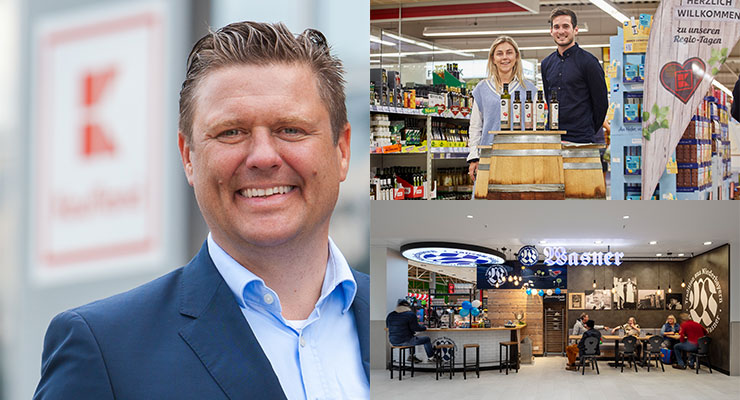ACROSS: Kaufland is a prominent individual player. To what extent do you individualize your locations?
Angelus Bernreuther: We individualize when it makes sense, where it is possible, and if it is necessary. Kaufland operates in eight countries and counts over 1,500 stores. The concept is initially standardized and ready to be rolled out. That is why the logo and the stores from Bulgaria to Poland and Germany look similar or identical. At the same time, our national companies act very independently in their day-to-day operations and make their respective adaptations to suit the local conditions.
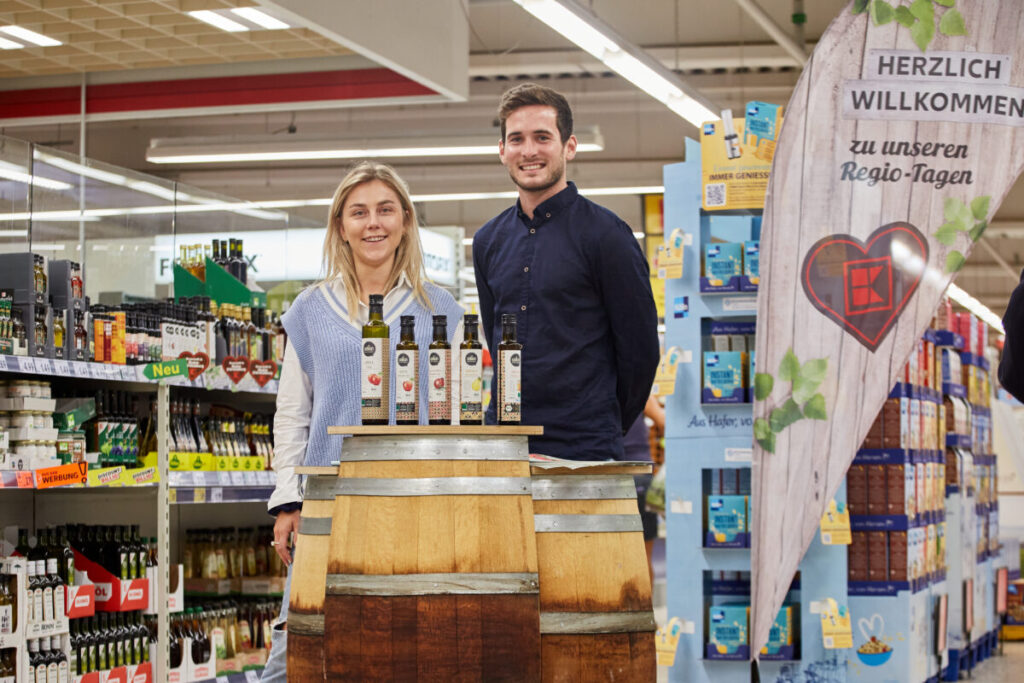
Individualization, regionalization, and community building are essential trends for Kaufland. Their local responsibility and roots become particularly evident during the “Regio Days”, when once a year, producers can introduce themselves directly to customers at the stores and provide information about their products.
credit: Kaufland
ACROSS: Can you give us an example?
Bernreuther: This is most evident at the product level. We have an average of 30,000 items in our range, depending on the country. There are fewer in Eastern Europe and a little more in Germany. That has to do with the size of the shopping areas. First, the product range consists of the most popular products in the respective country. Then, there are our brands, which are being increasingly regionalized for specific countries. Then, there is the local range, where we try to include leading regional producers and brand manufacturers from a radius of around 50 kilometers around the store. Those local products range from beer and cheese to pasta and are specially marked on the shelves with our “Regio Heart”. The local company knows precisely what the local demand is and also highlights regional trends with the help of market research.
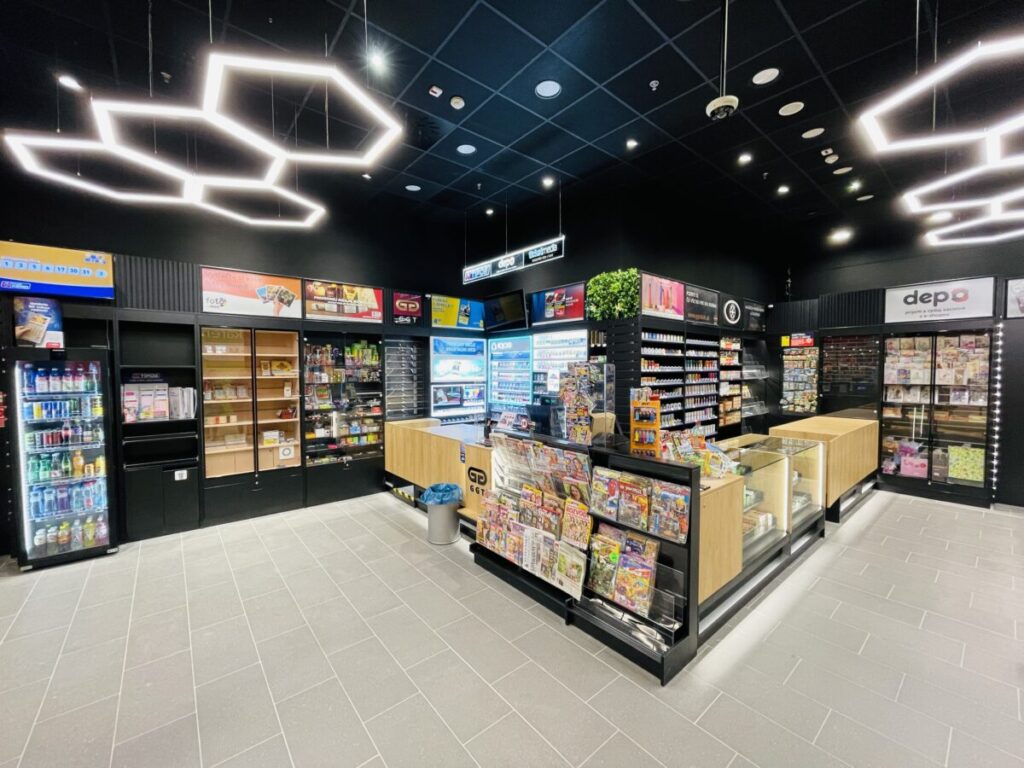
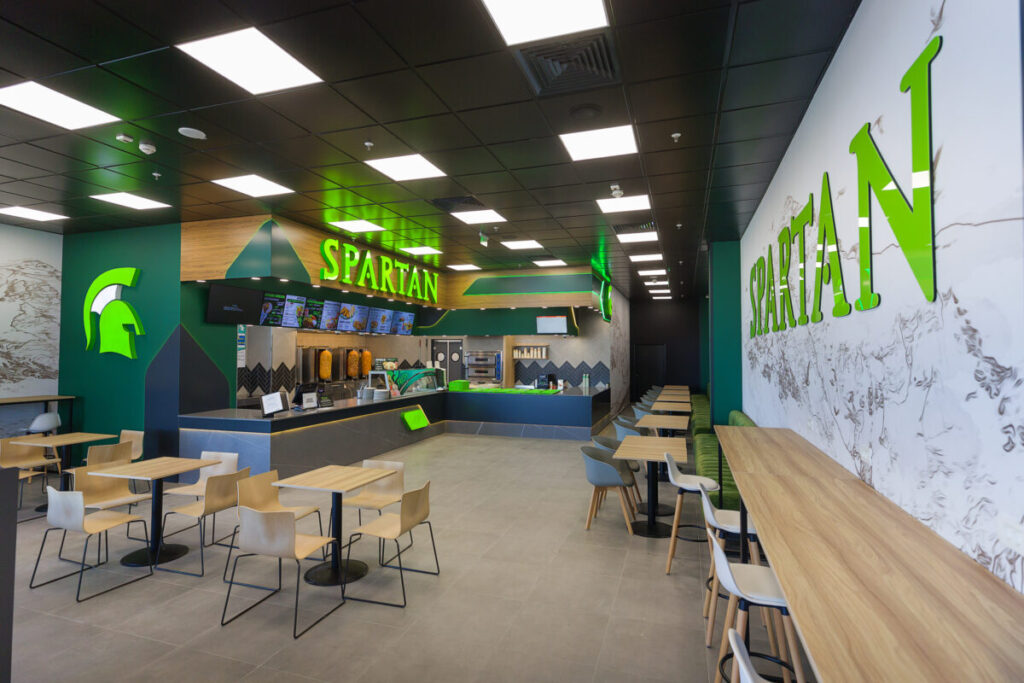
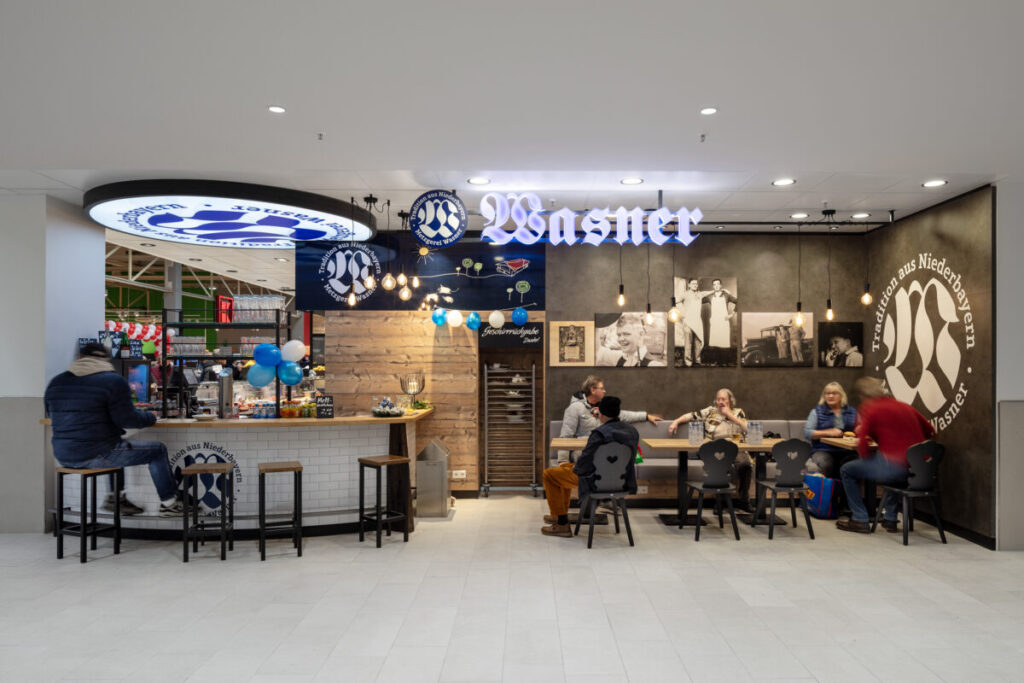
At most locations, Kaufland operates and leases the concessions areas themselves. That ensures that each store’s own, individual offer is tailored to the catchment area: Concession areas in Trinava, Slovakia, Brasov, Romania, and Waiblingen, Germany. /// credit: Kaufland
ACROSS: Apart from the product range, where is market individualization most apparent to the customer?
Bernreuther: The area that has changed most recently is the checkout zone. Several trends come together here: individualization, regionalization, and community building. At most locations, we operate and lease the concessions areas ourselves. We can bring in cafés, bakeries, butchers, fast food outlets, and popular services, such as lottery and tobacco stores and newsagents, to create meeting places. Our landlords take a very close look at the best tenants in the region and which bakery, for example, is the most popular in the area.
ACROSS: Apparently, Kaufland wants to be a place of social interaction.
Bernreuther: We have taken the idea of local supply further. We want our customers to identify with our products and would like to be a meeting place. The concessions area is naturally predestined for that, which also goes hand in hand with the further development of store design. It has recently become much more inviting and attractive, especially at our new store openings. Nevertheless, a few elements are also in demand by customers, such as lottery tickets, magazines, and, in some cases, pharmacies, which take more work to individualize.
ACROSS: Besides individualization and community building, what role does customer service play?
Bernreuther: There is a noticeable difference between food retailers – especially larger ones – and other retail formats and the food service industry. We focus on the human factor; a supermarket comprises customers, employees, and products. That, however, is precisely where we need to differentiate. For us, service means clarity, efficiency, and simplicity. Therefore, we continue to increase shopping efficiency when customers know what they want and offer support when they are undecided or need information. We must keep a clear eye on what customers expect from a supermarket. They don’t need people to serve them everywhere, but they do need a contact person at specific points, for example, when entering and leaving the store as well as at the information desk, service counters, and self-scan checkouts.
ACROSS: What does efficient shopping at Kaufland look like?
Bernreuther: Customers come into the store, motivated by our advertising. They can take the K-Scan device to scan goods themselves and start their shopping. As customers walk through the store, they pass products that are on special promotion via in-store marketing, such as regional products. At the end of the shopping trip, customers choose between self-scanning checkouts and the conventional checkout counters. If customers use K-Scan, they only need to scan once and can pay directly. The next level is our Kaufland Pay payment system. Customers pay automatically during the scanning process. These services, which optimize the shopping experience, are very popular and well-received by our customers.
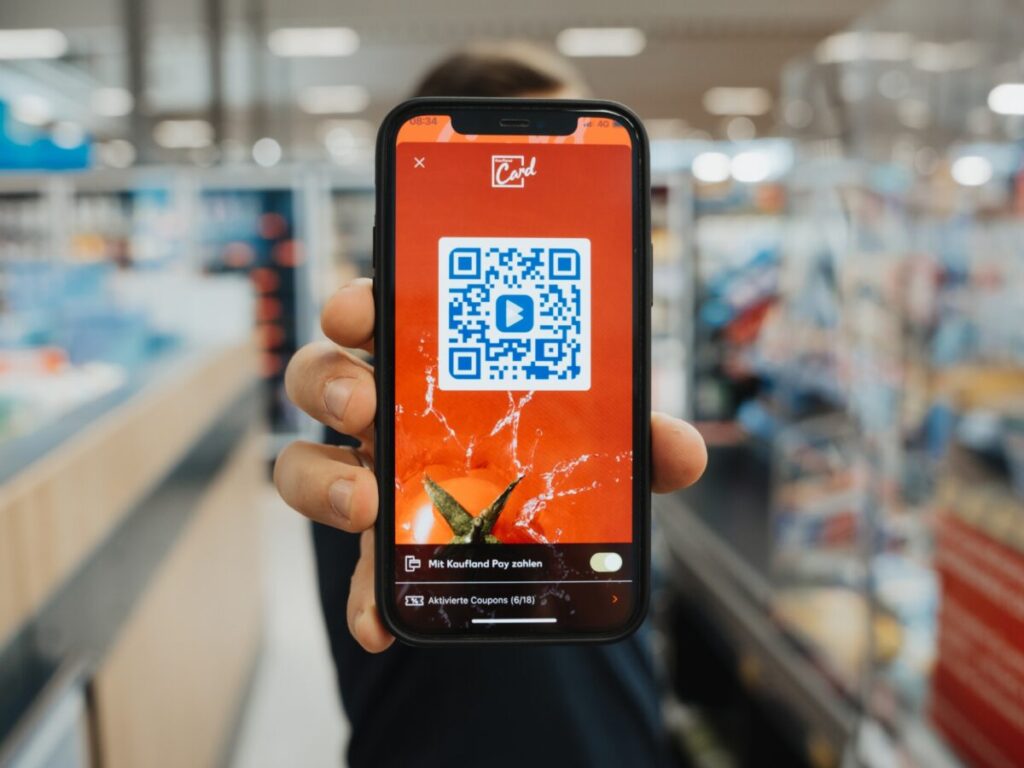
The Kaufland Pay payment system allows customers to automatically pay during the scanning process. Such services optimize the shopping experience and are very popular and well-received by the customers.
credit: Kaufland
ACROSS: However, those services tend to appeal to a younger target group.
Bernreuther: That was our expectation, too, but reality has shown that self-scanning checkouts do not have a specific target group. As it turns out, the choice depends on the amount of shopping items. It’s not just young, dynamic people who don’t have time and just want to grab something for their lunch break. At least as many older people try them out, sometimes with the help of our staff. Older people, in particular, feel more relaxed in this regard.
ACROSS: As a food retailer, how would you describe your customer journey?
Bernreuther: Ideally, customers visit us two to three times a week. We attract customers to our stores as part of their information search, usually via offers, which must then be converted into purchases at the stores. The aim is to make the purchasing behavior and the actual purchase as simple as possible so that the customer ideally still has more than enough time to have a cup of coffee in the concessions area afterward. I want to use the word experience sparingly, especially concerning other retail areas. Still, it’s about making the necessary everyday shopping as efficient and pleasant as possible for customers.
ACROSS: What are the most critical channels when it comes to addressing customers?
Bernreuther: We maintain and update our website constantly. The Kaufland app is an essential tool, and we are one of the food retailers with the most significant reach in Europe regarding social media and influencer marketing. These very different channels allow us to address all target groups and increasingly reach younger customers. For example, Kaufland cooperates with HeyMoritz, an influencer with whom we have already implemented several campaigns, including our training initiative, and who has launched his own chewing gum. I did not know much about HeyMoritz before that, but my children sent me to Kaufland to buy the chewing gum. It is imperative to use all channels equally. For example, our flyers are not just available in printed form, but are also distributed via WhatsApp.
ACROSS: What roles do events and sponsorship play?
Bernreuther: Kaufland sponsors the national ice hockey team in the Czech Republic, for example. Ice hockey is the most popular sport in the Czech Republic, so we generate a lot of attention. Events and sponsorship are also crucial at a local level. We have a field hockey pitch on the roof of the Kaufland store in Erfurt, Germany. One of the most important and popular field hockey tournaments in the region takes place there every year. Our local responsibility and roots become even more evident during our Regio Days. Once a year, producers can introduce themselves directly to customers at the stores and provide information about their products.
ACROSS: What role does the Kaufland Card play in all of this?
Bernreuther: The demand for the Kaufland Card is continuously increasing. The Kaufland Card is the linchpin and will become the central connection to our customers. This is where online and offline come together; its services can be upstream and downstream, and information about the stores can be easily shared. Our customers benefit greatly from the card, and we naturally get to know our customers much better. Since we know where customers come from, have some of their personal data, and know their shopping preferences, we can offer them an individualized range of products for their respective situations. Customers don’t need all 30,000 products, but if you have just become a father, you need specific products for a certain time, and it is precisely those products that we can present and put together for you – and make them more affordable with coupons.
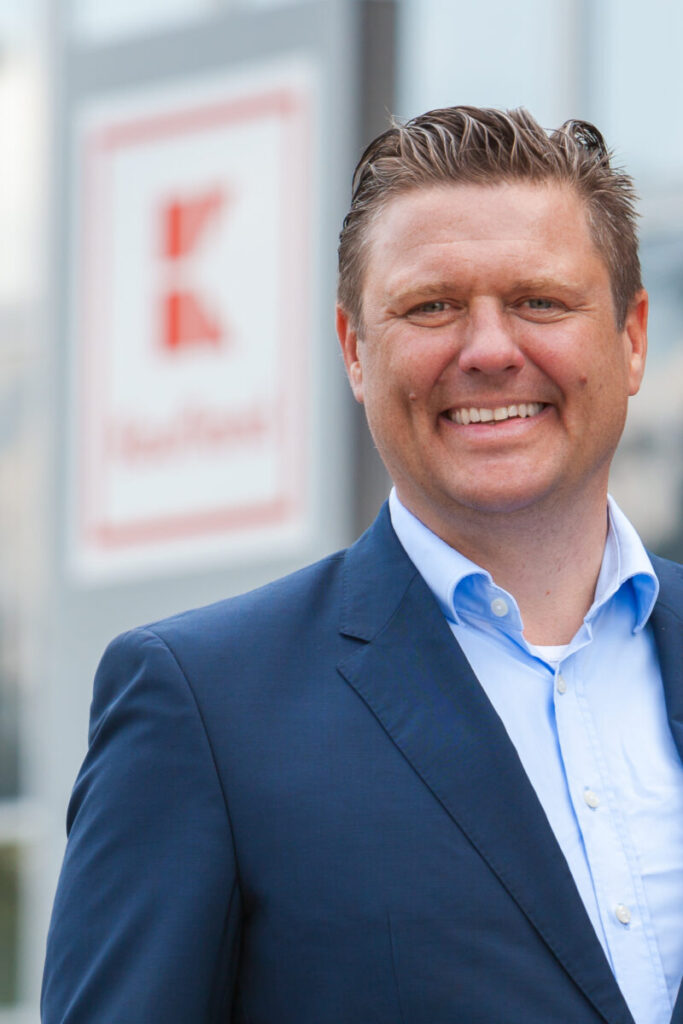
Angelus Bernreuther
Angelus Bernreuther is the Head of Investor Relationship Management at Kaufland

